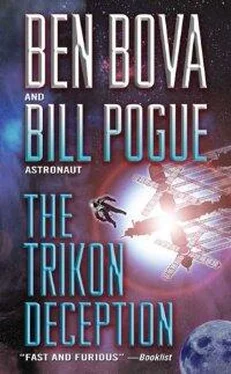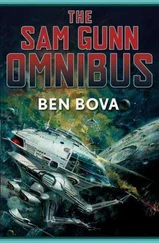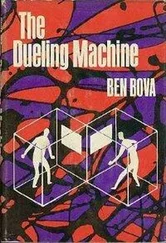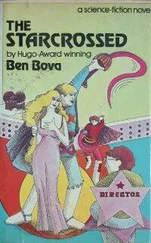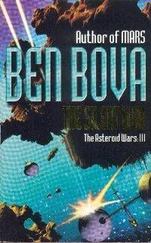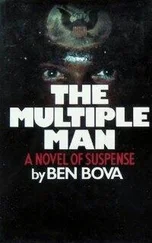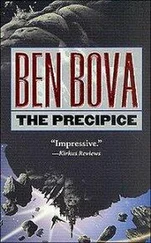We’re all going to die, said a voice inside his head. We’re going to die and it’s my fault. All my own goddamned stupid fault.
The Mars module was about five meters starboard of the station’s leading edge and drifting slowly. Dan flew the MMU into that gap. Both hatches appeared to be properly sealed. Dan jetted around to the aft end of the module. The only way to see inside was through the observation blister—if the lid of the clamshell was retracted.
It was.
Inside the blister, a male and a female Martian clutched each other while their crimson flight suits, turned inside out but still attached to their wrists and ankles, billowed around them.
“What the hell!” Dan yelled into his helmet microphone.
“Don’t know,” said O’Donnell. “Look there.”
Beyond the Martians coupling and through the open door of the blister, Kurt Jaeckle bounced between the floor and ceiling of the module, cushioning each landing with his hands and feet. There was an unmistakable expression of glee on his face, the kind Dan expected Jaeckle would wear if he ever landed on Mars.
“This module isn’t going anywhere,” said Dan as he tapped out a tiny blast from the retrothrusters. “We’d better get inside.”
“But it’s drifting away!” O’Donnell’s voice in his earphones sounded demanding, urgent, but not panicked. That’s something, at least, Dan said to himself.
Aloud, he answered, “It’s sealed tight. It’s got no propulsion. It’ll drift, but we’ll be able to get it and reattach after we get the station straightened away.”
O’Donnell did not answer. Dan hoped his tone of command instilled more confidence than he actually felt. Maybe they could get the Martians back before the damned ET drifted too far. Maybe. It depended on what the hell was going on in the station itself.
Dan looked carefully at each of the other modules as he and O’Donnell looped toward the main airlock. Nothing else was obviously amiss. There was no voice traffic over any of the comm channels and the single life-support alarm still blared.
It seemed to take hours to get to the airlock, detach the MMU, open the hatch, and go inside. Dan looked through the tiny portholes of the airlock’s inner hatch as he started the repressurization pumps. Halfway down the connecting tunnel, Stu Roberts jerked about as if holding the end of a live wire.
“What the hell’s he doing?” Dan muttered over the clattering of the pumps.
O’Donnell nudged Dan away.
“Giving a rock concert,” he said matter-of-factly. “Does that every day.”
O’Donnell’s interpretation lent a crude logic to Roberts’s movements. The young tech windmilled his arm across the strings of an air guitar, pounded invisible drums, and ran his fingers along the keys of an imaginary piano. Two pairs of European couples, their lab uniforms disheveled and torn, popped out of ELM. They whirled and tumbled, their faces contorted in silent laughter. Hisashi Oyamo followed, bare to the waist. He pounded his beach-ball gut with his fists as he drifted near Roberts.
Dan tried calling Lorraine. Static crackled on Channel D. O’Donnell cut in on Channel C. “Green light, Dan.” The airlock pressure had equalized.
“Don’t open your helmet!” Dan snapped. “We’re keeping the suits on. I show one life-support alarm sounding. Everybody’s acting so weird, maybe there’s something in the air.”
“Like what?”
“Who the hell knows? But the suits stay on.”
Suddenly, Dan’s comm unit exploded into a synthesized cacophony of Klaxons, horns, buzzers, and bells. The airlock seemed to slide sideways and both men tumbled toward its outer hatch.
“What—?” O’Donnell gasped.
Outside the hatch’s porthole, the stars seemed to slant dizzyingly across the black sky. But Dan didn’t need a visual to know what was happening.
“The station!” he yelled. “It’s gone into a tumble!”
4 SEPTEMBER 1998
TRIKON STATION
Sometime earlier, while Dan was prebreathing pure oxygen in preparation for visiting the observatory, Chakra Ramsanjawi had sailed forth from his compartment in Hab 1 wearing an emergency breathing mask and a tank strapped to his back that held a three-hour air supply. The time was 0945 hours, and no one was in the connecting tunnel to notice him. The Martians and Trikon scientists were at workstations in their respective science modules. Freddy Aviles was still sleeping off the side effects of the previous night’s interrogation. Stanley was on duty in the command module in Tighe’s usual place.
Ramsanjawi slipped into the logistics module. From beneath his kurta, he removed a small cylinder made of rubber and plastic. With a flick of his hands, he broke the impermeable inner partition that separated the two highly reactive gases he had toiled through the night to create. The cylinder seemed to come alive in his fingers as the two gases combined with a hiss.
He spent a minute analyzing the spaghetti of wires, hoses, and ducts that comprised the veins and arteries of the life-support system. Then, using the same type of screwdriver he had provided Aaron Weiss, he quickly removed a protective collar and sliced open a duct. An alarm would sound in the command module, but that was no matter. The surprise he had dreamed up for the people of Trikon Station was so fast-acting that he doubted anyone would have time to respond.
He pushed the cylinder into the air duct, punctured its rubber seal with the blade of the screwdriver, then quickly replaced the collar over the slit.
The hatch darkened; someone had reacted quickly to the alarm. Ramsanjawi hid himself behind a wall of cylinders and watched crewman Stanley trace along the duct system in search of the problem. Within minutes the sandy-haired Aussie found the collar and inspected it carefully, rubbing his jaw and comparing the actual duct work with a binder of specs tethered to his belt. He was about to detach the collar when he suddenly began to whistle. He flung his screwdriver away. It clattered among the supply cylinders, bouncing so close to Ramsanjawi’s head that the Indian flinched.
Stanley’s whistling quickened into a snappy polka. He locked his hands at the base of his spine and moved his legs like a figure skater.
Ramsanjawi stole out of hiding. He edged past Stanley, carefully avoiding the strong, fluid movements of the crewman’s feet. Stanley did not miss a note. His eyes fell directly on Ramsanjawi without acknowledging his presence, preferring, Ramsanjawi knew, the pageant playing within his mind.
Ramsanjawi waited at the hatch, smiling behind his oxygen mask. Another minute or two and everyone would be occupied with their own personal dreams. The treasures in O’Donnell’s lab would belong to him.
Kurt Jaeckle had taken the scent wafting through his office to be lilacs. His nose trembled as if he were about to sneeze, but he pinched his nostrils and the urge passed. The scent seemed stronger, and for a moment he thought he saw a thin purple plume curling out of the air vent. He waved his hand and the plume—if it ever existed—dissipated. He drew two long draughts of air deep into his lungs. The air was sweet, so sweet.
Suddenly, Jaeckle had an idea. It was such a great idea, such a fantastic notion, that he wondered why it had not occurred to him long before. He opened the accordion door and twirled out his office.
The Martians were at their workstations, but no one seemed interested in work. They moved their hands toward their gaping mouths as if the air were made of custard.
“Friends, Romans, fellow Martians,” Jaeckle called in his most stentorian voice. “This is the day we have hoped and prayed and worked for over so many long, hard years. We are about to set out for the red planet Mars, at last. This is history! All in favor, say aye!”
Читать дальше
